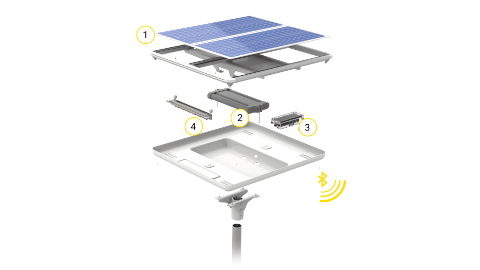
Smart city technology is, by its very nature, innovative. In the past few years, there has been an explosion of new hardware, software and data-enabled approaches. Entrepreneurs in this sector are doing their part and creating exciting products and services to address communities’ unmet needs.
Here are a few of the more unique applications that are emerging in smart cities:
TRAXyL: “Painting” optical fiber on pavement
The digital economy depends on access to high-speed Internet. However, laying fiber can be a quagmire for cities that have not streamlined and standardized their telecommunications approach. Industry is faced with a complex web of regulations that differ city to city, while cities are often overwhelmed with the number of options related to fiber expansion and mobile broadband (including 5G) deployment. The result can be an expensive endeavor for all involved with unpredictable costs and installation headaches due to trenching and building in the urban right-of-way.
TRAXyL hopes to simplify that process by “painting” fiber on pavement instead of costly and destructive construction or trenching. FiberTRAX® promises a “cost-efficient, versatile, and quick” option that bonds fiber to pavement and encases it in protective coatings. This approach promises a 30-75% reduction in costs to install compared to existing methods.
They are active in Stillwater, OK; Fauquier County, VA; Warrenton, VA and hope to extend to campuses, bases, complexes, subdivisions, construction sites, parking lots, and other paved surfaces across the country.
Recovered Energy Technologies: Smart Solar Street Lighting
Off-grid solutions are becoming more appealing as some utilities struggle with the realities of natural disasters, modernization and the need for new business models and partnerships. While redundant lighting options are nothing new, Recovered Energy Technologies ups the game with their solar-powered, bluetooth-connected, Wi-Fi-enabled Sunna street light.
The Sunna light promises ‘significantly lower costs of installation, virtually no maintenance and no operating costs’ while eliminating the need for trenching. Maintenance can be monitored and managed remotely via a mobile app. The system can create a street light mesh network, integrating with IoT devices such as sensors, cameras and/or digital signage to track and monitor a wide range of smart city initiatives.
When it comes to life-saving procedures, gaining access to the right instruction and training can be a matter of life or death, especially for those in remote and underserved communities. Through VR technology, ImmerTech is developing software which allows multiple users anywhere in the world to instantly connect and train real-time in a fully immersive virtual environment, through any VR headset. Think about a surgeon thousands of miles away being trained in real-time by a subject matter expert, gaining insights during a life-saving procedure.
A server-less design allows for almost-instant delivery with less than 200 millisecond latency. However, with the continued expansion of 5G, the live-streaming 3D-VR software will only increase in its effectiveness and application. The VR training market is expected to grow to $6.3 billion by 2022.
These are just a few of the thousands of products and companies that are emerging to create technology-enabled solutions to real-world problems. Even the most traditional industries that have struggled to keep up with the pace of innovation are being inspired with remarkable advances. These three startups are gaining traction quickly. Please share and inspire other leaders to think beyond old-fashioned approaches and embrace new ways of thinking and doing.